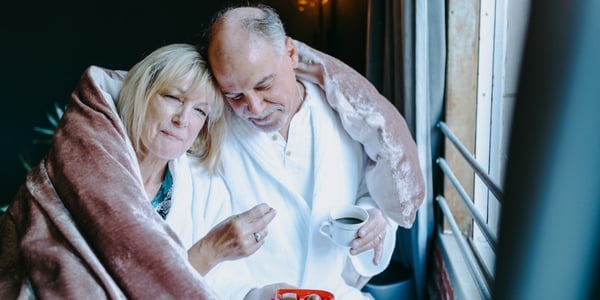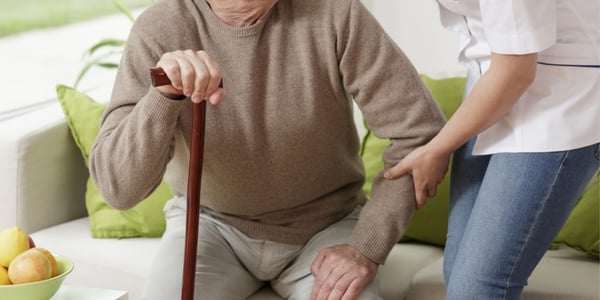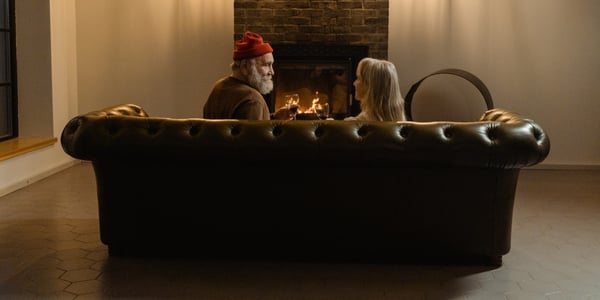Winter weather can be harsh and unforgiving, especially for older adults who may be more vulnerable...
10 Tips to Stay Safe and Warm this Winter
As the fall comes to an end, the harsh and sometimes unforgiving months of winter set in. The first snowfalls of the year are exciting and enchanting. However, it is essential to remember that the winter season brings inherent risks to safety and wellness. Prepare accordingly to ensure you have a pleasant and safe winter!
Try These 10 Tips to Stay Safe and Warm this Winter!
-
Keep Warm
The first step for older adults to stay safe throughout the winter is to keep warm. This is the best remedy against cold-related health risks that are common during this period. Even at home, it is possible to expose yourself to too cold of temperatures. Follow the tips below to stay safe:
-
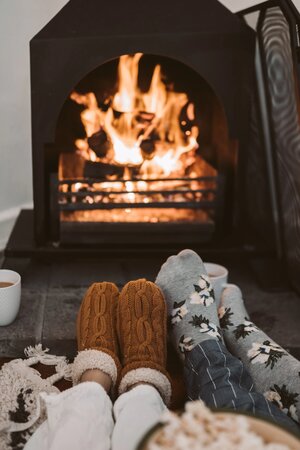 Dress in warm clothes from the toes to your head. While relaxing on the chair, use a blanket to cover the feet.
Dress in warm clothes from the toes to your head. While relaxing on the chair, use a blanket to cover the feet. -
Sit near a fireplace. This warms not only yourself but the whole room!
-
Winterize your windows and unused doors. Consider interior insulation, which you can learn more about here!
-
Close all the vents and doors of rooms you are not using. This should save the heat and concentrate it in the necessary places.
-
Pay attention to nutrition. This provides fuel to the body and helps you properly circulate heat throughout the body.
-
Lay off the alcoholic drinks. While it might make you "feel" warmer, it thins blood and encourages heat loss from the body.
-
When it's time to sleep, layer up. Dress warmly in clothes that cover your body, feet, and, if necessary, head. Also, don't forget to get extra covers or blankets for that extra warm and cozy feeling all night!
-
-
Avoid Carbon Monoxide Poisoning
Carbon monoxide presents a severe threat to individuals of any age. This gas is odorless and colorless, essentially making it undetectable by humans. When it becomes too concentrated in a room, it can lead to death. Thus, as wonderful as it is to keep warm by a fire during winter months, carbon monoxide is a great danger that lurks in many households with traditional wood-burning fireplaces.
Installing carbon monoxide detectors throughout the house is a necessity to protect yourself against this poisonous gas. This gadget allows one to be aware of when there is air poisoning.
It's not only the fireplace that can present a risk of carbon monoxide. Furnaces, lanterns, water heaters, cigarette smoke, and car engine fumes can all be sources of carbon monoxide. Thus, the installation of these gadgets is recommended in the bedroom, living room, and garage. -
Prevent Fire Outbreaks
According to reports by the American Red Cross, fire outbreaks in homes are common during the winter months. A common cause for the increase in home fires during the winter is the need for heating devices. Space heaters should only be turned on when in use and someone is in the room. Turn it off before leaving to spend time in another room. It is also important to read the manual, which explains more safety precautions like ensuring it is kept a safe distance from anything flammable or that could melt. The same measures should be taken for other heating elements, like the stove. That said, other preventive measures to avoid fire outbreaks include:
-
Ensure Smoke Detectors are Working
Go throughout your residence and ensure smoke detectors are all functioning correctly. Batteries should be replaced regularly.
-
Use an Artificial Christmas Tree
A natural Christmas tree is often preferred. They come with incredible scents and feel amazing. However, they make homes vulnerable to fire outbreaks. And as such, it is advised to use an artificial Christmas tree instead. And while buying the artificial tree ensures it's labeled "resistant to fire".
-
Have Extinguishers Ready
This is a critical safety tip that guarantees your safety in case of a fire outbreak. With a fire extinguisher ready in the house, you significantly increase your chances of putting out small fires. However, it's not just about having it in your home - be sure you are knowledgeable about how to use it in case of an emergency!
-
-
Maintain Your Vehicles
If you have a car, this is a crucial step in ensuring your safety throughout the winter. It is essential to ensure vehicles are properly maintained and serviced at all times. This includes replacing and rotating tires, topping off windshield wiper fluid (ensure it is rated to not freeze in cold temperatures), changing oil, and always having at least half of a tank of gas throughout the winter.
Additionally, everyone should have a phone charging system in the car in case of emergencies. A functional GPS and fall detector is also handy during emergencies. Lastly, you can use a medical alert bracelet when going out in your car as a last resort. -
Stay Social
According to the National Institute of Mental Health (NIMH), older adults have a higher risk of suffering from depression, which is most prevalent in those staying alone in their homes. Too many older adults may not have friends or relatives to look after them at home or stop by to check-in. This state promotes loneliness and can lead to depression. To avoid this condition during winter, it is important to stay social during these months. When the roads are snowy and icy, it can be easy to form a habit of staying in and spending time alone. Therefore, we recommend the following ideas to avoid loneliness this winter:
-
Organize In-Home Care
If it is difficult for friends and family to visit regularly, a great alternative may be to organize in-home care. Some in-home caregivers stay throughout the day and night, while others are only available during the day. Not only does this option help prevent loneliness, but it also can help make daily activities easier.
-
Virtual Visits
It has never been easier to connect with friends and family without being in the same room. In addition to phone calls, families can easily enjoy video chats to stay engaged as often as desired with that extra personal touch.
Learn more about strategies to combat loneliness - click here!
-
-
Secure the Extension Cords
This is a handy safety tip, especially for those who love decorations in their homes. However, it's not only about decorations. During winter, many things are often plugged into extension cords. As a result, cords can be left loosely everywhere throughout the house and yard, which can be a major cause of accidents that lead to both mild and severe injuries.
Thus, ensure all the cords, especially those for heaters, radios, lights, televisions, etc., are well secured. While doing so, ensure all the cables are well insulated to avoid electric shocks or short circuits. While you're at it, avoid having too many plugs on one outlet and overloading the circuit.
-
Prepare for Power Outages
In the winter season, it is very important to be prepared for power outages. Ice buildup, heavy snow, fallen trees, and more can all contribute to damaged power lines. Thus, it's essential to be prepared before the loss of power hits your neighborhood. To do so, start by taking these steps:
-
Keep a flashlight with fully charged batteries close to you. Consider keeping flashlights in important places around the house, like in the kitchen and next to your bed.
-
Ensure your pantry is stocked with non-perishable foods that don't depend on refrigeration.
-
Prepare for periods without heat. If you have a wood-burning fireplace, make sure you have extra wood. If needed, purchase an extra blanket and warm clothing like wool socks.
-
-
Avoid Falls
Accidents are common during winter, and one of the greatest dangers to older adults is falling. To avoid this, consider the following helpful tips:
-
Shovel the snow and salt the walkways
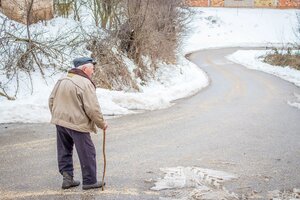 Snow and icy walkways are the number one cause of falls. But by shoveling the snow earlier and salting the icy surfaces, you can reduce the likelihood of such accidents. If you cannot clear the snow yourself, arrange ahead of time for a neighbor or professional to help.
Snow and icy walkways are the number one cause of falls. But by shoveling the snow earlier and salting the icy surfaces, you can reduce the likelihood of such accidents. If you cannot clear the snow yourself, arrange ahead of time for a neighbor or professional to help. -
Wear proper footwear
Footwear also plays a significant role in ensuring your stability as you walk out of your house. Wear footwear that's comfortable and has a firm grip that will prevent you from sliding on icy or slippery walkways.
Click here to learn more about the best footwear styles for older adults!
-
Allow for extra time
Falls can result from hurrying. In the winter, it is especially important to allow yourself extra time to get from here to there. Drive carefully, walk slowly, and minimize your chances of a slippery disaster.
-
-
Ensure the Medicine Cabinet is Properly Stocked
There are emergency drugs and medical supplies one needs to have in their home. When winter approaches, it's important to ensure the medicine cabinet is stocked with these medical supplies. They may become handy in emergencies where access to a medical facility is difficult or even. While filling your medicine cabinet, ensure you have backup medications if needed. Check that they can last at least a month during emergencies.
-
Be Aware of Severe Weather
It's important to be aware of the weather patterns during this season. This is especially true if you are actively driving yourself. You should be able to know when the weather is about to become severe and unforgiving when you walk out. Sometimes, the weather looks fine when you leave the house, but an unexpected storm can leave you stranded. Check the weather forecast and radar frequently to minimize this risk.
Are You Feeling Ready for Winter?
Implementing home safety tips is essential for everyone. However, it is especially important for older adults and those living alone. These tips will help ensure that you will enjoy your winter festivities in good health and with fewer worries during the chilly months of winter.
Let us know below! What is your best winter preparation tip?



